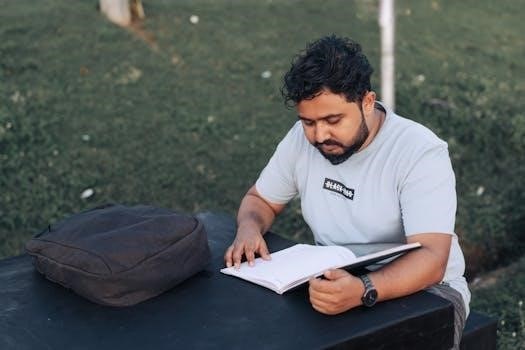student self reflection questions pdf
Student Self-Reflection Questions⁚ A Comprehensive Guide
This comprehensive guide explores the power of student self-reflection. It provides a curated list of thought-provoking questions designed to foster deeper thinking and self-awareness in learners. These questions encourage students to critically assess their learning experiences, study habits, and overall mindset.
In the realm of education, fostering critical thinking and self-awareness is paramount. Student self-reflection emerges as a powerful tool, enabling learners to delve into their experiences, understand their strengths and weaknesses, and identify areas for growth. It’s a process where students examine their own learning, performance, and progress, leading to enhanced metacognition and a deeper understanding of themselves as learners.
This guide introduces the concept of student self-reflection and its significance in promoting academic and personal development. By engaging in self-reflection, students can monitor their learning, identify gaps in their understanding, and adjust their strategies accordingly. Moreover, it encourages them to analyze their interactions with others, fostering self-awareness and improving communication skills.
We will explore various types of self-reflection questions, practical exercises, and strategies to develop these crucial skills. This exploration will provide educators and students with valuable insights and tools to cultivate a reflective mindset, ultimately leading to a more enriching and effective learning journey. The aim is to empower students to take ownership of their education and become lifelong learners.
What are Self-Reflection Questions?
Self-reflection questions are structured inquiries designed to prompt individuals, in this case students, to critically examine their thoughts, feelings, experiences, and actions. They serve as catalysts for introspection, encouraging learners to delve deeper into their understanding of themselves and the world around them. These questions aren’t about finding right or wrong answers, but rather about fostering a process of exploration and discovery.
These questions can cover a wide range of topics, including learning strategies, personal growth, skill development, and mindset. They might ask students to consider their strengths and weaknesses, analyze their successes and failures, or evaluate their interactions with others. The goal is to encourage students to move beyond surface-level understanding and engage in deeper, more meaningful reflection.
Ultimately, self-reflection questions are tools that empower students to become more self-aware, intentional, and proactive in their learning journey. By prompting them to pause, think, and analyze, these questions cultivate a habit of continuous improvement and a lifelong commitment to personal and intellectual growth. They are essential for developing metacognitive skills and promoting a deeper understanding of oneself as a learner.
The Importance of Self-Reflection for Students
Self-reflection is crucial for students as it fosters self-awareness, allowing them to understand their strengths, weaknesses, and learning styles. This understanding empowers them to take ownership of their education and make informed decisions about their learning strategies.
Furthermore, self-reflection enhances metacognitive skills, enabling students to think about their thinking. This allows them to monitor their progress, identify areas where they struggle, and adjust their approach accordingly; By actively engaging with their learning process, students become more effective and efficient learners.
Self-reflection also cultivates a growth mindset, encouraging students to view challenges as opportunities for learning and development. It promotes resilience by helping them to bounce back from setbacks and persevere in the face of adversity. Through reflection, students can identify what motivates them, set meaningful goals, and develop a sense of purpose in their academic pursuits.
Moreover, self-reflection improves communication and interpersonal skills. By reflecting on their interactions with others, students can gain insights into their communication style and learn how to build stronger relationships. It encourages empathy and helps them understand different perspectives.
Types of Self-Reflection Questions for Students
Self-reflection questions can be categorized based on their focus and purpose. Learning reflection questions prompt students to analyze their understanding of specific concepts, evaluate the effectiveness of different learning strategies, and identify areas where they need further clarification. They encourage students to think critically about what they’ve learned and how they can apply it in different contexts.
Backward-looking reflection questions invite students to review past experiences, identify patterns in their behavior, and analyze the factors that contributed to their successes and failures. They help students learn from their mistakes, celebrate their achievements, and gain a deeper understanding of their personal growth;
Reflection questions on skills, study habits, and mindset encourage students to assess their strengths and weaknesses, identify areas for improvement, and develop strategies for overcoming challenges. They promote self-awareness and empower students to take control of their academic and personal development.
Furthermore, questions focusing on emotional responses and social interactions can help students develop emotional intelligence and improve their relationships with others. These questions prompt students to consider how their emotions influence their behavior and how they can communicate more effectively with their peers and teachers.
Learning Reflection Questions
Learning reflection questions are designed to encourage students to think deeply about their learning process and understanding of concepts. These questions prompt students to analyze what they’ve learned, how they learned it, and how they can apply that knowledge in the future. They are crucial for fostering metacognition and promoting a growth mindset.
Examples of learning reflection questions include⁚ “How did that go?” which encourages students to evaluate their performance on a task or assignment. “What strategies help me to be successful in school?” prompts students to identify effective learning techniques. “Which piece of teacher feedback has had the greatest impact on me?” helps students recognize the value of constructive criticism. “How does daily journaling support my learning?” encourages students to explore the benefits of reflective writing.
These questions help students monitor their own learning progress, identify gaps in their understanding, and develop strategies for addressing those gaps. They also encourage students to take ownership of their learning and become more self-directed learners. By reflecting on their learning experiences, students can gain a deeper understanding of themselves as learners and develop the skills they need to succeed in school and beyond.
Backward-Looking Reflection Questions
Backward-looking reflection questions invite students to examine past experiences and learning to extract valuable insights. These questions encourage students to analyze their prior knowledge, the processes they undertook, and how past experiences relate to current learning. This type of reflection promotes self-awareness and helps students make connections between different learning experiences.
Examples of backward-looking questions include⁚ “How much did you know about the subject before we started?” This helps students assess their initial understanding and measure their growth. “What process did you go through to produce this piece?” encourages students to deconstruct their work process and identify effective strategies. “Have you done a similar kind of work in the past?” prompts students to connect current learning to past experiences and identify patterns.
Furthermore, these questions enable students to objectively evaluate their progress, understand their strengths and weaknesses, and identify areas for improvement. By looking back at their past experiences, students can gain a deeper understanding of their learning journey and develop strategies for future success. Backward-looking reflection is an essential component of continuous improvement and lifelong learning.
Reflection Questions on Skills, Study Habits, and Mindset
This category of reflection questions focuses on helping students assess and refine their skills, study habits, and overall mindset towards learning. These questions encourage students to critically evaluate their approaches to studying, problem-solving, and managing their time, as well as to examine their beliefs and attitudes about their abilities and potential.
By prompting students to reflect on their skills, study habits, and mindset, educators can empower them to become more effective and self-directed learners. Questions like “What strategies help me to be successful in school and life?” encourage students to identify and reinforce effective learning strategies. “What strengths or beliefs did you share?” prompts students to consider their personal contributions and underlying beliefs.
Furthermore, reflection questions can help students identify areas where they need to improve their skills, adjust their study habits, or cultivate a more positive and growth-oriented mindset. This self-awareness can then inform their future learning goals and strategies. Ultimately, these questions help students develop essential metacognitive skills and become more resilient and adaptable learners.
Practical Exercises to Encourage Self-Reflection
Incorporating practical exercises can significantly enhance students’ self-reflection abilities. These exercises provide structured opportunities for students to actively engage with their thoughts, feelings, and experiences. One effective exercise is the “Think-Pair-Share” activity, where students individually reflect on a question, discuss their thoughts with a partner, and then share with the larger group. This promotes both individual and collaborative reflection.
Another valuable exercise involves using reflective prompts. Teachers can provide students with specific questions or scenarios to consider, encouraging them to delve deeper into their learning process. For example, students can reflect on a recent project by answering questions such as, “What did I learn from this experience?” and “How can I apply this knowledge in the future?”.
Creating a “Reflection Portfolio” is another practical approach. Students can compile their reflections, self-assessments, and feedback throughout a course or semester. This allows them to track their progress, identify patterns, and gain a comprehensive understanding of their learning journey. These exercises empower students to become more self-aware, proactive, and reflective learners.
Journaling for Self-Reflection

Journaling offers a powerful avenue for students to engage in regular self-reflection. By consistently documenting their thoughts, feelings, and experiences, students can cultivate self-awareness and gain valuable insights into their learning process. Encourage students to establish a dedicated journal, whether physical or digital, specifically for self-reflection purposes.
Provide students with specific prompts or questions to guide their journaling entries. These prompts could relate to their academic progress, personal growth, or challenges they are facing. For example, students could reflect on a recent test by answering questions such as, “What study strategies were most effective?” or “What areas do I need to improve?”.
Emphasize the importance of honesty and vulnerability in journaling. Students should feel comfortable expressing their true thoughts and emotions without fear of judgment. Regular journaling not only enhances self-awareness but also improves writing skills and promotes critical thinking. Encourage students to review their past entries periodically to track their growth and identify recurring patterns or themes in their lives. This consistent practice fosters a deeper understanding of oneself and promotes lifelong learning.
Data Analysis for Student Self-Reflection
Data analysis provides a powerful tool for students to gain objective insights into their learning journey. By examining various data points, such as grades, test scores, attendance records, and feedback from teachers, students can identify patterns, strengths, and areas for improvement. Encourage students to view data as a source of valuable information rather than a measure of their worth.
Teach students how to interpret data effectively. Explain basic statistical concepts, such as averages, trends, and correlations. Help them understand how to visualize data using charts and graphs to identify meaningful patterns. For example, students can track their grades over time to see if their performance is improving, declining, or remaining consistent.
Facilitate discussions about the implications of the data. Encourage students to ask questions such as, “Why am I struggling in this particular area?” or “What strategies have been most effective in improving my performance?”. By analyzing data and reflecting on its meaning, students can develop targeted strategies to enhance their learning outcomes. It fosters ownership of their academic progress and promotes data-driven decision-making.
Strategies to Develop Self-Reflection Skills
Cultivating self-reflection skills requires a multifaceted approach. Start by incorporating regular reflection prompts into classroom activities. These prompts should encourage students to think critically about their learning process, challenges, and successes. Use open-ended questions that promote deeper analysis rather than simple yes/no answers. Model self-reflection by sharing your own experiences and thought processes with students.

Encourage journaling as a means of documenting thoughts, feelings, and insights. Provide structured journal prompts to guide their reflections initially, gradually allowing for more open-ended entries. Create a safe and supportive classroom environment where students feel comfortable sharing their reflections without fear of judgment. Emphasize that self-reflection is a process of growth and learning, not a measure of perfection.
Integrate peer feedback activities where students provide constructive criticism to one another. This process helps them develop empathy, communication skills, and the ability to view their work from different perspectives. Encourage students to create portfolios showcasing their best work and reflecting on their growth over time. Use discussions to explore what they have learned and what they want to improve.

Examples of Self-Reflection Questions
To spark insightful self-reflection, consider these examples. “What strategies help me succeed in school and life?” This encourages students to identify effective habits. “Which teacher feedback had the greatest impact on me?” prompts reflection on valuable criticism. “What have I learned about myself in the past six months?” invites personal growth analysis.
Further examples include⁚ “How did that go?” promoting immediate post-activity assessment. “What strengths or beliefs did I share, and why?” encourages awareness of personal contributions. “Did anything unexpected happen, and how did I respond?” fosters adaptability recognition; “What will I change and improve upon in the future?” inspires proactive development.
More questions to consider⁚ “How much did I know about the subject before we started?”. “What process did I go through to produce this piece?”. “Have I done a similar kind of work in the past?”. Use these questions as a starting point, adapting them to suit specific learning objectives and individual student needs. These questions are designed to initiate a deeper understanding of one’s learning journey.
Benefits of Using Self-Reflection Questions in Education

Self-reflection questions boost student engagement and enhance learning by encouraging students to ponder their experiences, understandings, and feelings. They promote deeper thinking and self-awareness, enabling growth. By critically assessing their learning, students identify gaps in their understanding and monitor their progress effectively. Through reflection, students objectively evaluate skill development.
Furthermore, self-reflection cultivates inquisitive minds, encouraging students to delve deeper and question further. This process nurtures intellectual growth and a voyage of self-discovery. Students become more aware of their strengths and weaknesses, allowing them to tailor their learning strategies. Reflection helps students understand how they interact and communicate with others.
Moreover, self-reflection encourages them to recognize how they may be perceived by others, boosting self-awareness. Utilizing data analysis in self-reflection enables students to track their learning. It also promotes the development of metacognitive skills, improving thinking, retention, and learning strategies. Ultimately, self-reflection equips students with lifelong learning skills.
